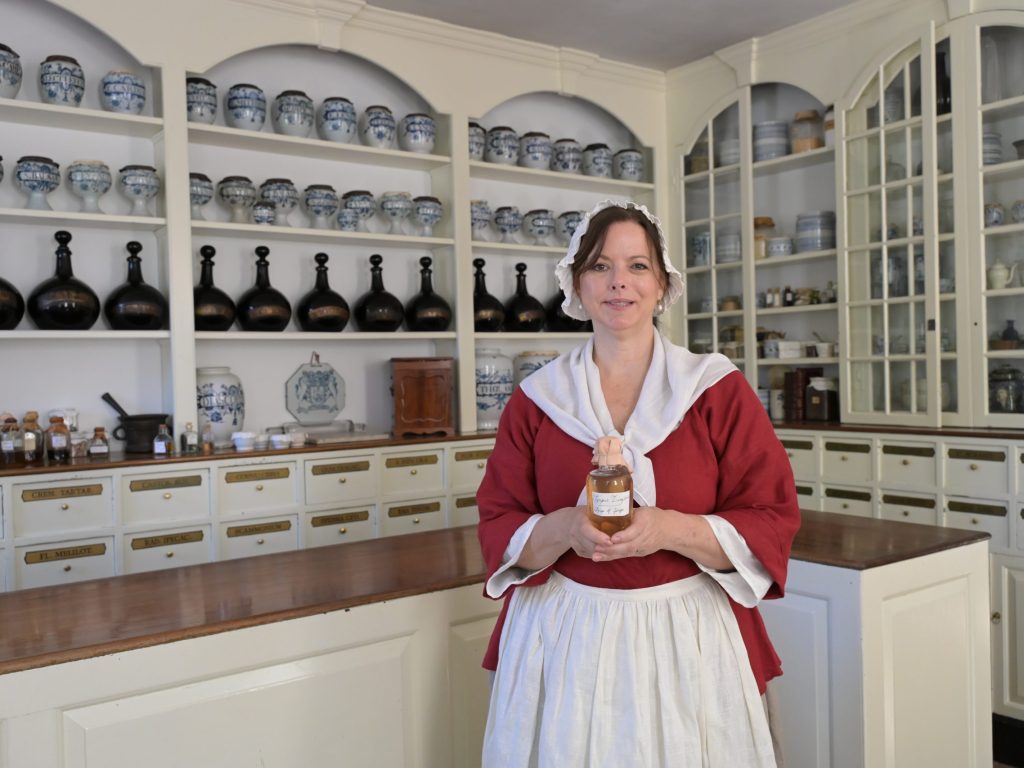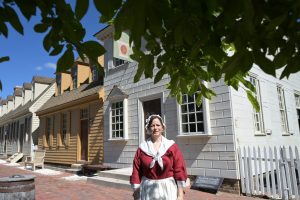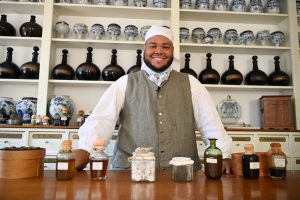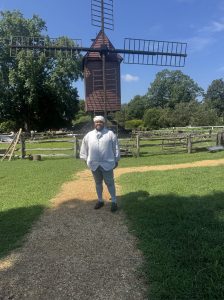CPHS offers unique rotation experience at Colonial Williamsburg

Campbell provides many opportunities for students to receive hands on experience through internships, externships, and clinical rotations. These experiences allow students the opportunity to put classroom knowledge to use, hone specific skills, and determine or solidify an area of interest. Fourth year pharmacy students Susan Propst and Quan Vinson completed a unique Advanced Pharmacy Practice Experience (APPE) rotation in Colonial Williamsburg.
This rotation is sponsored by the American Institute of the History of Pharmacy and coordinated by the employees of the Pasteur and Galt Apothecary in Colonial Williamsburg. It is a special rotation as it takes the foundation of pharmacy practice from the past and merges it with the practice of modern medicine.
The students were able to compound various medications using the same recipes and techniques from the 1700s. There are no electronic balances or mixers, so everything is done by hand and using antique equipment. Compounding came easily as the students used some of the same techniques that they learned during their first year of pharmacy school.
Susan Propst (’26 PharmD Candidate) learned a great deal about 18th century medical history. “I learned to compound various medications using the 18th century recipes and materials that were in the apothecary shop. I made a conserve of orange peel and syrup of ginger, both used for stomach ailments. I also made a tincture of valerian root used for nervous disorders, syrup of elderberry used for colds and sore throats, and camphor ointment used for muscle soreness and as a chest rub,” she revealed.
Quan Vinson (’26 PharmD Candidate) spent time reading books, stories, publications, patient cases, and historical documents from the 1700s. His preceptor, Sharon Cotner, wanted him to understand the history of medicine in the colonial era, how apothecaries were implemented in Williamsburg, and about their public health impact. “My Preceptor knew that I had a business background, so she ensured that I understood that all raw ingredients were imported from England and the business process. She allowed me to look at business documents so that I could analyze the process of purchasing products and compounding medications so that they could be dispensed,” Vinson remarked.

The students were also exposed to interpretations or “Mini Lectures.” Guests visit Williamsburg to learn more about the apothecaries and the common practices during the colonial era. There is an art to interpretation, and everyone has a different style. “It was my task to observe so that I could develop my own style, which I did within the first week. I loved answering curious questions from our guests who travel from all over the world,” Vinson shared.
 During his time in Virginia, Vinson took time to explore Williamsburg and meet many of the blacksmiths, farmers, and merchants. They shared how they support the apothecary. Another interesting aspect of this rotation is that the students wore colonial-style clothing.
During his time in Virginia, Vinson took time to explore Williamsburg and meet many of the blacksmiths, farmers, and merchants. They shared how they support the apothecary. Another interesting aspect of this rotation is that the students wore colonial-style clothing.
Vinson shared, “One of the things they wanted to capture was what a ‘man of color’ would look like, and I thought their attention to detail was amazing. They studied documents and art to design four costumes for me. One point of reference was Lucas Peters, who was known as the first black physician in the colonial era. I was able to learn more about him and speak about him and his contribution during that time period, even though he was not located in Williamsburg. This was important for me to learn so that I could share historical context while giving lectures.”
This experience helped bridge the gap between past pharmacy practice and modern medicine, giving the students the experience of a lifetime. Propst has a special interest in working with the geriatric population. For her final project, she spent time comparing the medication used in the geriatric population in the 18th century vs modern day medications. From various compounding lab techniques to research abilities, Propst noted, “I felt very prepared for the rotation and CPHS helped instill the confidence I needed to make this a great experience.”
